Have you noticed that you or your child have bleeding gums, perhaps while brushing your teeth or flossing? If so, it’s great that you’re reading up on what causes gums to bleed and how to treat them, since this is not a problem that should be ignored. Even if you just have red gums or a sore gum around one tooth, it could be a sign of oral health problems that need attention.
So, how do you stop bleeding gums and treat the problem?
Fortunately, it’s often possible to stop gums from bleeding without even visiting a dentist. In this article, you can read about some common bleeding gum causes and treatments – including toothpastes and mouthwashes. We’ll also explain the symptoms of more serious conditions related to a bleeding mouth which might require medical care.
It’s common for women to experience sore, bleeding gums in pregnancy, so you can read about that here too – as well as what to do if you notice your child’s gums are bleeding.
We hope this information helps you make better decisions about your oral health so you can maintain healthy gums and teeth.
In This Article
Why are my gums bleeding?
By far the most common reason for bleeding gums is gum disease. Early gum disease affects 50% of British adults, according to the British Society of Periodontology, and most cases are preventable.

In its most mild form (gingivitis) it begins as slight swelling, redness and irritation around the gums, but as it becomes more advanced (periodontitis) it can lead to dental abscesses and tooth loss.
Gum disease is almost always the result of poor oral hygiene. When teeth aren’t cleaned properly, bacteria builds up between the tooth and gum and forms a layer of plaque. This plaque irritates the gum around the tooth, and gums can be come swollen and puffy as your body tries to fight the bacteria. These conditions often cause the gums to bleed, too – especially when aggravated further by a toothbrush or dental floss. Some people find their gums bleed when eating, or even spontaneously.
Pregnant women need to take particular care with their oral health because hormone changes during pregnancy make them more susceptible to tooth decay and gum disease.
There are other factors that might cause gums to bleed, including:
- Stress
- Vitamin deficiency
- Bruxism (teeth grinding)
- Oral cancer
- Diabetes
- Leukaemia and other conditions that affect the blood
- Certain medications
However, these causes of bleeding gums are relatively rare. It’s much more likely your gums are bleeding because of poor oral hygiene leading to gum disease. If you’re taking aspirin or other blood-thinning medication, this can make gums more likely to bleed – and bleed for longer.
Further down you can find out what to do if you’ve noticed bleeding from your mouth when you eat, floss or brush – or seemingly at random. The short video below from dentist Dr Gurs Sehmi also gives a really good overview of the causes and how to stop your gums from bleeding:
Are my teeth bleeding?
It might look like your teeth are bleeding, but if you think you see blood coming from your teeth, it’s almost certainly just the gum bleeding around your tooth.
The hard outer surface of your tooth, dental enamel, has no blood supply. It’s only the inner pulp chamber that contains blood vessels. Your gums, on the other hand, are full of blood vessels which will cause bleeding gums if they are exposed.
Note: If a tooth is broken due to injury or trauma, exposing the dental pulp, you may see the tooth bleeding from the centre. If this is the case, follow this dental emergency advice and seek urgent medical care.
Sensitive, sore or red gums
Perhaps your gums aren’t actually bleeding, but instead, they are noticeably irritated or red. You might be experiencing sensitive gums, or just have a sore gum around one tooth.
These are all signs of gingivitis (gum inflammation from early gum disease). Improving your oral health may be enough to reverse these symptoms before your gums start bleeding, so keep reading to find out what to do next.
Swollen gums with no pain
Healthy, normal gums should be flat and smooth along the gum line, with a small point between each tooth (called a papilla). A raised line along the teeth or swollen gum between teeth is a sign that your body is fighting bacteria and trying to stop it from entering other parts of your body. In other words, swollen gums – even with no pain – are just another symptom of gum disease.
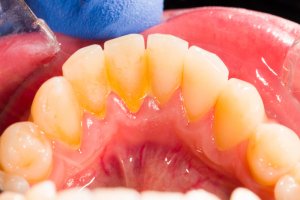
You might notice you have swollen gums behind your front teeth more often than in other places, and there’s a reason for this. Saliva tends to pool in this area of your mouth, and it contains proteins which can cause plaque to harden into tartar more quickly than it does normally. This encourages more bacteria to breed, and the problem escalates. Tartar can’t be removed by brushing; your dentist needs to use special tools to dislodge it.
What causes bleeding gums?
Gum disease is the main reason for bleeding gums and insufficient oral care is the main reason for gum disease (gingivitis). Learn which products can help you stop and prevent bleeding gums.
But first, there are a few specific things that might explain why your gums bleed at a particular time.
Bleeding gums when brushing teeth
Have you noticed you spit out blood when brushing your teeth? Healthy gums shouldn’t bleed when brushed with the proper technique, so this is probably a sign of gum disease. But it’s not all bad news; the fact that your gums bleed when brushing your teeth at least means you’re brushing where it’s really needed – down at the gum line.
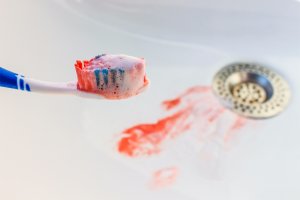
Improving your oral care routine or switching to a new toothbrush often causes gums to start bleeding when brushing. You might be doing a better job at removing that plaque, but it’s irritating your gums at the same time. Give your mouth a little while to get used to your new habits and see if the bleeding reduces.
Similarly, if your gum is bleeding around one tooth when you brush, give that tooth some special attention for the next few days and see if it improves.
You might be tempted to avoid the areas of your gum that are bleeding when you brush your teeth, but that will only encourage more plaque to build up and make the problem worse. Certain toothbrushes are designed specifically for people with bleeding gums or gum disease. They have very soft bristles so as not to irritate the gums further. Read more about these and other specialist brushes in our guide to the best manual toothbrushes.
If you have gums that bleed after you brush or floss, it can be a sign of a number of different problems. While seeing your dentist can help you get to the root of the problem faster, some common causes of bleeding gums can be:
- Gum disease – which causes inflammation that can lead to the bleeding
- Hormone changes – hormonal changes, like pregnancy, can make the gums more susceptible to bleeding
- Brushing too harshly – if you’re brushing near the gum line with too much force it can cause bleeding
- Beginning to floss – if you haven’t been flossing and just added it to your routine, it can result in bleeding the first few times
Bleeding gums can also be a side effect of medication or a different underlying health issue. If your gums are bleeding every time you brush, make an appointment to see your dentist today. Catching problems early can help prevent costly and more intensive procedures down the road.
Dr. Ania Mohelicki
Gums bleed when flossing
Flossing should be a part of your daily oral hygiene routine. It helps clear away food and plaque from between the teeth and below the gum line. In reality, of course, very few people floss daily – if at all.
If you have just started flossing, or you only do it occasionally, you shouldn’t be all that surprised to see that flossing is making your gums bleed. There is probably already some plaque buildup on your teeth which has caused your gums to become inflamed and sensitive. Start flossing regularly and you should notice your gums bleed less and less.

Another reason for gums bleeding when flossing is improper technique. If you snap dental floss into your gum with too much force, it can damage the tissue and cause bleeding. Read more about how to floss properly and the best products for flossing.
Many people find that a water flosser is easier to use – and much more gentle on gums – than traditional dental floss. These devices, also known as oral irrigators, shoot a jet of water between each of your teeth. The Waterpik Ultra is a popular model with variable intensity settings, so you can start off slow while you get used to it.
Your gums may bleed or feel sore when you start using a Waterpik for the same reasons outlined above but persist for a few days and you should notice a difference.
Bleeding gums without brushing
If you have particularly sensitive gums as a result of gum disease, simply eating food may be enough to cause them to bleed – especially hard or crunchy food.
Another possible reason for bleeding, inflamed or swollen gums between teeth is that some food has got stuck – often resulting in the gum bleeding around one tooth only. If you can’t dislodge any food by flossing (a water flosser is preferable to avoid pushing it down further) then ask your dentist to check it out.
If you mainly notice your gums bleeding at night, bruxism (teeth grinding) might be contributing to the problem. Your dentist may be able to prescribe a custom night guard or there are some that are available to buy online. We have a separate guide that covers more bruxism symptoms and treatments if you think this might be affecting you.
What if your gums are bleeding randomly, not just when you brush or eat? It’s alarming to see your gums bleeding for no reason, but this is probably a sign that your teeth need a proper clean at the dentist before you develop more serious gum disease.
Gums bleeding after stopping smoking
You don’t expect your gums to start bleeding after you quit smoking, but this is actually quite common. This is because chemicals in cigarettes inhibit bleeding and help mask the problem. When you quit, and blood circulation improves, the symptoms of any gum disease will start to show.
Take a trip to the dentist for a scale and polish, and follow their oral hygiene advice, and the bleeding should soon stop.
Bleeding gums during pregnancy
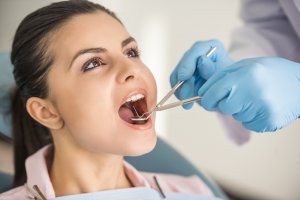
It’s quite common for women to experience swollen or bleeding gums while pregnant, especially during early pregnancy. This is because the hormonal changes that happen around this time encourage bacteria growth in the mouth, as well as making gum tissue more sensitive.
Even if you have impeccable oral hygiene, you may still develop what’s known as ‘pregnancy gingivitis’. And if you already have gum disease when you become pregnant, there is a greater risk of it developing into periodontitis.
Periodontal disease in pregnancy has been linked to low birth weight, preterm birth and pre-eclampsia. To reduce your chances of gum disease and bleeding gums during pregnancy, you can:
- Visit your dentist for regular tooth cleanings while you’re trying to get pregnant and throughout your pregnancy
- Tell your dentist that you’re trying or expecting so that he or she can give you the right care and advice
- Brush twice a day and floss daily
- Make sure you’re getting enough vitamin A, C & D, calcium, protein and phosphorous in your diet. If you want to take a pregnancy supplement, follow these NHS guidelines and don’t take anything containing extra vitamin A.
If you do get bleeding gums while pregnant despite all of this, don’t hesitate to see your dentist. NHS dental treatment is free for pregnant women and until your child is one year old, so make the most of it.
For more information about overall oral health during pregnancy, including sensitive teeth and bleeding or sore gums, the British Society of Periodontology has some useful resources here.
Child, toddler or baby’s gums bleeding
Noticing that your child or baby’s gums are bleeding is even more alarming than when it’s your own mouth.
Remember, first of all, that babies and toddlers love putting things in their mouths. It’s easy for them to pick up a small injury in this way which causes their gums to bleed.
But if you notice your child’s gums bleeding right along the gum line, or if their gums are just red and sore around the teeth, it’s probably one of three things:
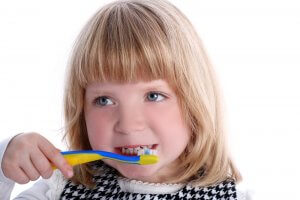
- Sore or bleeding gums in children can be caused by gum disease from poor oral hygiene, just as with adults. You may also notice receding gums and/or bad breath.
- Switching to a new toothbrush might give your child or toddler bleeding gums – always choose a toothbrush with soft bristles.
- Brushing too hard can damage your child’s tender gums – use gentle pressure and help or supervise until they are six or seven years old.
You should take your baby for regular dental checkups as soon as they have their first tooth. Not only does this let their dentist spot any problems early on; it also gets them used to the experience so visiting the dentist isn’t as scary when they get older.
Our guide to children’s oral health has lots more information on how to take care of your children’s teeth and gums and prevent common problems like tooth decay.
Vitamin deficiency
Another thing that causes gums to bleed, or can worsen an existing problem, is deficiencies of certain vitamins.
Vitamin C, for example, helps with tissue growth and repair. It’s also important for strengthening teeth and bones, and protecting against early gum disease. If you’re not getting enough vitamin C, your gums may appear swollen and bleed more easily. Citrus fruits, strawberries, tomatoes, broccoli, potatoes and bell peppers are all good sources of vitamin C.
Vitamin K deficiency is also associated with excessive bleeding, since it helps with the blood clotting process. Leafy greens like kale, spinach and watercress contain vitamin K, as do soybeans and olive oil.
You can have a blood test to check whether you’re getting enough of these and other important vitamins.
How to stop bleeding gums
You’ve probably worked out by now that there is no instant cure for bleeding gums: the best way to treat bleeding gums is by improving your oral hygiene. You might also need to visit your dentist for a thorough dental cleaning, known as scaling, to properly remove all the plaque below the gum line.
The video below shows the tools and procedure used for a simple dental scaling. We have a separate page that goes into more detail on the scale and polish procedure.
If your gum disease is in the early stages, you may be able to reverse it and stop your gums from bleeding by adopting these habits for better oral hygiene:
- Brush your teeth at least twice a day; ideally once in the morning and again before bedtime
- Brush for two minutes, spending 30 seconds on each quadrant of your mouth
- Replace your toothbrush or toothbrush head every three months
- Floss daily, either with dental floss or a water flosser
- Use an antibacterial mouthwash to rinse (but not immediately after brushing)
- If you smoke, stop! Smoking increases the risk of gum disease
- Continue regular dental checkups – at least once a year and more often if advised
Read more detailed instructions for brushing your teeth.
If you’re unsure how to brush and floss your teeth properly, don’t feel shy about asking your dentist to show you the correct technique next time you visit. Doing it right can make all the difference to your oral health.
When to see your dentist about sore and bleeding gums
If your gums keep bleeding occasionally or remain sensitive, you should certainly mention it to your dentist at your next checkup. Simply improving your oral hygiene is not always enough to reverse the underlying cause; you might need a thorough dental cleaning. With an NHS dentist, dental scaling comes under the Band 1 treatment charge (currently £23.80 in England). Your dentist will also check for other oral health problems that may be linked to the condition of your gums.
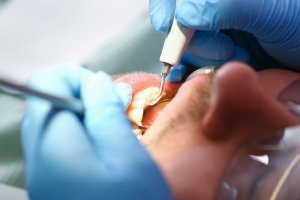
In some cases, though, you shouldn’t wait until your next routine checkup. Book a dental appointment straight away if you experience any of the following:
- You have constantly bleeding gums (they won’t stop bleeding)
- There are patches or irregular growths on your gums that stay for more than two weeks
- One or more teeth feel loose
- You’re in significant pain
If you don’t see a dentist about your gums bleeding and just ignore the problem, you may well develop severe gum disease. This has been linked to diabetes and cardiovascular problems, and can cause tooth loss if it progresses far enough. It’s also possible you have another serious health condition which needs proper treatment. You may need a blood test to rule out certain disorders.
Best products for bleeding gums treatment
There are various products which may help stop bleeding, red or sore gums by targeting the underlying causes like plaque buildup. Keep in mind that these should be used in conjunction with the good oral care habits mentioned above. A new toothpaste won’t help much if you only brush every other day.
What’s the best electric toothbrush for bleeding gums?
People who struggle to clean their teeth properly often find that switching to an electric toothbrush makes a big difference.
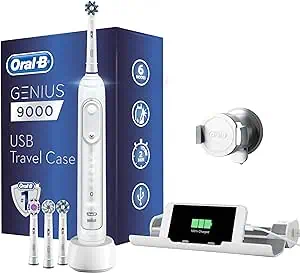
Oral B’s Genius X has several features which make it a good toothbrush for treating bleeding gums:
- A timer to ensure you’re brushing each part of your mouth for long enough
- Gum pressure control which tells you if you’re brushing too hard
- A special sensitive brush head
- AI position detection to track how you brush
- Bluetooth connectivity to an app which helps you improve your brushing
The Oral-B Pro 3 3000 lacks some of these features but is a more affordable option.
Your gums may continue bleed when you first brush with an electric toothbrush – the bleeding may even get temporarily worse. That’s usually just a sign that your improved brushing is working, so keep it up for a few days and you should notice a difference.
What’s the best toothpaste for bleeding gums in the UK?
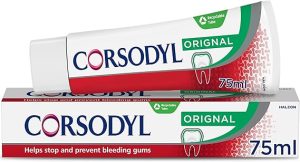
Lots of mainstream brands make ‘gum care’ toothpastes with ingredients to target gingivitis. Corsodyl Original, for example, contains sodium bicarbonate to help remove more plaque when you brush. It’s also free from sodium lauryl sulphate; an ingredient that some people find irritates their mouths. The only downside, according to reviewers, seems to be its unusual taste.
For a natural option, you could try Green People Fennel & Propolis Toothpaste. Several reviewers say this has helped them treat bleeding gums.
What’s the best mouthwash for bleeding gums in the UK?
Cordosyl also make a medicated mouthwash specifically for treating and preventing gingivitis. You should only use this for up to 30 days at a time, when your gums are actually bleeding. Longer-term use can stain teeth.

The rest of the time you could use Corsodyl’s everyday gum care mouthwash or Listerine Total Care. Any kind of antiseptic mouthwash will help fight the bacteria that cause red, sore gums.
If you are looking to use a more natural product, read our article on the best natural mouthwashes in the UK.
You shouldn’t use mouthwash straight after brushing your teeth, since this washes away the helpful ingredients in your toothpaste.
Home remedies for bleeding gums
If you prefer to try natural home remedies, a simple salt water rinse can help reduce bacteria and soothe irritated gums. Dissolve 1/2 teaspoon of salt in a glass of lukewarm water, swish it around in your mouth for 30 seconds, then spit it out. You can do this two or three times a day.
Coconut oil has anti-inflammatory properties, and a study has shown that swishing it around your mouth and between your teeth (known as oil ‘pulling’) can significantly decrease plaque-induced gingivitis. Read more about how to oil pull if you’re interested in giving this a try.
Summary of bleeding gums causes and treatment
The table below summarises the most common reasons why gums bleed that we’ve discussed in this article – and how to stop bleeding gums becoming a problem for you.
Symptom | Possible Cause | Possible Cause |
Red/sore/swollen gums | Gingivitis (gum inflammation/early gum disease) | Improved oral health, dental cleaning, regular checkups. |
Bleeding when brushing teeth or flossing (including children) | Gum disease | Improved oral health, dental cleaning, regular checkups. |
New toothbrush or brushing routine | Keep going - you should adjust in a few days. Use a soft brush for children. | |
Poor technique | Learn how to brush and floss properly (ask your dentist). | |
Gums bleeding at night | Bruxism causing gum disease | Speak to your dentist. |
Gums bleed after stopping smoking | Gum disease masked until now | Visit your dentist or hygienist. |
Bleeding gums during pregnancy | Pregnancy gingivitis | Improved oral health and regular checkups. |
Remember, even if you just have red gums or mild soreness and irritation right now, you may soon find your gums bleed when brushing your teeth if you don’t address the underlying cause.
Improving your oral hygiene may be enough to stop your gums from bleeding; otherwise your dentist will need to perform a deep cleaning. In any case, regular dental checkups are the best way to detect and treat the problems that cause bleeding gums, red gums and other oral health issues.
FAQs
What does bleeding gums mean?
Bleeding gums is usually a sign there is something wrong with your oral health. Don’t panic though; it may be quite easy to remedy. It’s a good idea to have a dental checkup sooner rather than later. In the meantime you can try sprucing up your brushing and flossing and perhaps using a special gum care toothpaste.
Is it normal for gums to bleed when flossing?
It’s not normal or healthy, but it is very common. Bleeding gums is predominantly a sign of gum disease, and over 50% of the British problem experience this at some point in their lives.
Why are my gums bleeding randomly?
If your gums bleed for no apparent reason, it’s probably because they have reached this sensitive state through gum disease. Check with your dentist to verify this. It’s possible there could be another health condition contributing to the problem.
Can stress cause bleeding gums?
Yes; over time stress can weaken your immune system and make it harder for your body to fight infections, including in your mouth. Inflamed, red and bleeding gums may be a result of this. The solution remains much the same: make sure you’re brushing and flossing correctly, switch to a gum care toothpaste, and have a dental checkup soon.
Why do gums bleed when pregnant?
Hormonal changes during pregnancy make women more susceptible to plaque buildup on their teeth, which in turn can aggravate the gums and make them bleed, making dental care even more important. It’s important to take extra care of your teeth when pregnant, and maintain frequent dental checkups. It’s free to visit an NHS dentist while pregnant and for 12 months after giving birth.
Is bleeding gums a sign of pregnancy?
Although pregnant women are at greater risk of gum disease, bleeding gums is not necessarily a sign of pregnancy. Pregnant or not, if your gums are bleeding then you shouldn’t ignore it.
How can I stop my gums from bleeding?
Since bleeding gums are usually caused by plaque buildup leading to gum disease, a thorough scale and polish should help a lot. Flossing daily will help keep your gums healthy. Some people can reverse early gum disease by simply improving their oral care routine and perhaps using a special toothpaste for gum care.
Delta Dental: 7 vitamins and minerals your mouth needs. Consulted 23 December 2020.
British Society of Periodontology and Implant Dentistry: Gum Health for a Better Life. Consulted 23 December 2020.





